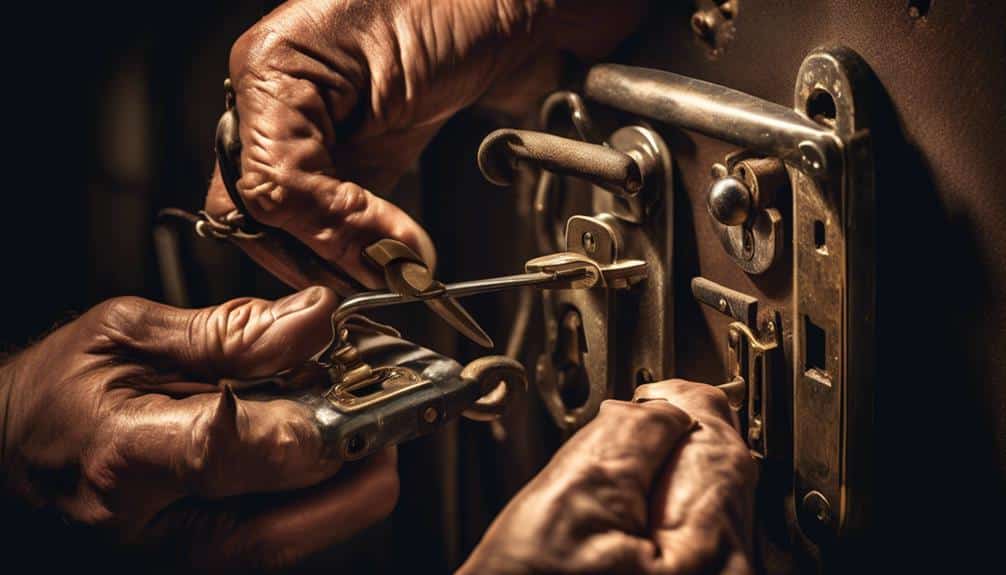Hey there!
We've all been there – you're rushing out the door, ready to conquer the day, when suddenly, your lock decides to throw a tantrum and refuses to cooperate. It's enough to make you want to throw in the towel and stay home, right?
Well, fear not! In this discussion, we'll be sharing some top lock repair tips that are just a stone's throw away. Whether you're a DIY enthusiast or prefer to leave it to the professionals, we've got you covered.
So, if you're tired of wrestling with your locks and yearn for a smoother, more secure experience, keep reading. Trust us, you won't want to miss out on these tips!
Common Lock Repair Issues
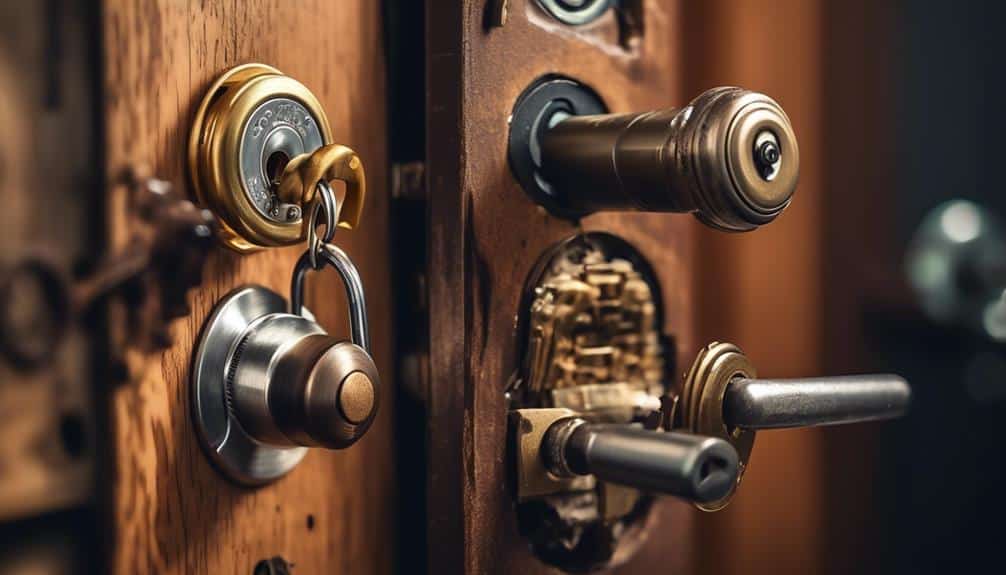
When it comes to lock repair, there are several common issues that can arise. Troubleshooting lock issues is an essential skill for any locksmith or homeowner. Let's explore some common lock repair techniques to address these issues effectively.
One of the most common lock problems is a sticky lock. This occurs when the lock mechanism becomes dirty or gummy over time. To fix this issue, start by lubricating the lock with a silicone-based spray. Apply the lubricant directly into the keyhole and work the key in and out several times to distribute it evenly. This should help the lock operate smoothly again.
Another common issue is a loose doorknob or lockset. This can be caused by loose screws or worn-out internal components. To fix this problem, tighten any loose screws and replace any worn-out parts as needed. Make sure to use the appropriate tools and follow the manufacturer's instructions for disassembly and reassembly.
In some cases, the key may not turn in the lock or may get stuck. This can be due to a misaligned lock cylinder or a worn-out key. To fix this issue, try inserting the key and gently wiggling it while applying slight pressure. If this doesn't work, consider getting a new key made or calling a professional locksmith for further assistance.
Importance of Regular Lock Maintenance
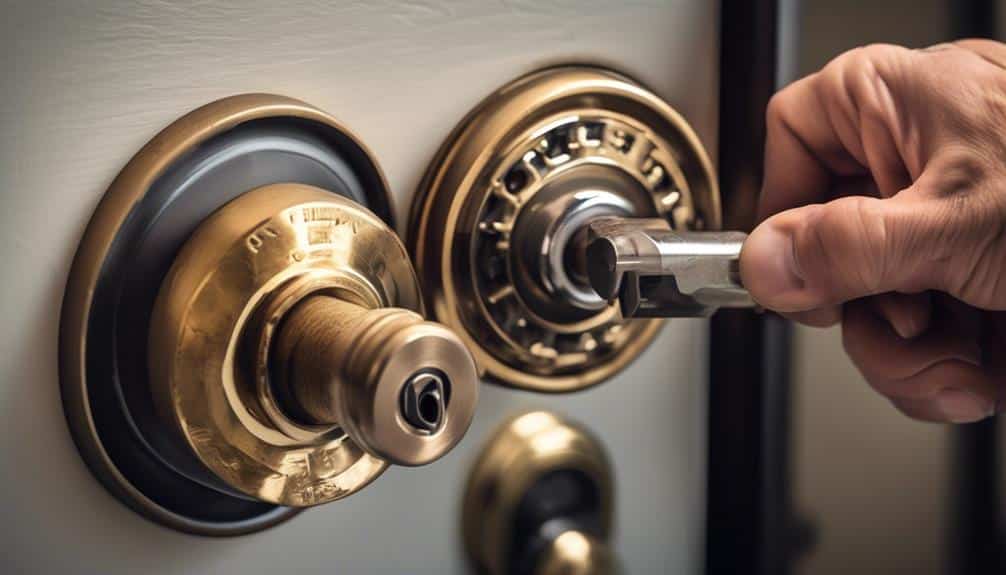
Regular lock maintenance is essential for several reasons.
First, it helps to prevent lock malfunctions, ensuring that your locks are always in proper working condition.
By regularly maintaining your locks, you can also prolong their lifespan, saving you the cost of frequent repairs or replacements.
Additionally, proper lock maintenance provides various benefits, such as enhanced security and peace of mind.
Benefits of Maintenance
Regular maintenance of locks is essential for ensuring their longevity and optimal performance. By consistently maintaining your locks, you can reap numerous benefits.
One of the primary benefits of regular maintenance is preventing lockouts. By lubricating the lock components and ensuring they're in good working condition, you can avoid the inconvenience and frustration of being locked out.
Additionally, regular maintenance can help identify and address potential issues before they become major problems. This proactive approach can save you time and money on costly repairs or replacements.
Another advantage of regular lock maintenance is improved security. Well-maintained locks are less susceptible to tampering or forced entry, providing you with peace of mind.
To keep your locks in top shape, regularly clean them, lubricate the moving parts, and check for any signs of wear or damage.
Preventing Lock Malfunctions
By consistently maintaining your locks, you can prevent lock malfunctions and ensure their optimal performance and longevity. Regular lock maintenance techniques are essential for keeping your locks in top shape and avoiding potential issues.
One important maintenance technique is lubricating the lock mechanism regularly with a graphite-based lubricant. This helps to reduce friction between the moving parts and keeps the lock system working smoothly.
Additionally, regularly cleaning the lock and removing any debris or dirt buildup can prevent jamming and ensure the proper functioning of the lock.
Troubleshooting lock issues promptly is also crucial in preventing lock malfunctions. If you notice any signs of difficulty in turning the key or if the lock starts to feel loose, it's important to address these issues early on to prevent further damage.
Prolonging Lock Lifespan
To ensure the longevity of your locks, it's vital to prioritize regular maintenance. Taking care of your locks not only prolongs their lifespan but also ensures their optimal performance.
Here are some reasons why regular lock maintenance is important:
- Prevents lockouts: Regular maintenance helps to identify and fix any issues before they become major problems, reducing the chances of being locked out of your property.
- Enhances security: Regularly maintaining your locks ensures that they're in good working condition, providing maximum security for your property and loved ones.
- Saves money: Preventive maintenance can help you avoid costly lock repairs or replacements in the future.
- Increases durability: Regular cleaning and lubrication of locks prevent rust and corrosion, extending their lifespan.
- Peace of mind: Knowing that your locks are well-maintained gives you the peace of mind that your property is secure.
Signs Your Lock Needs Repairing
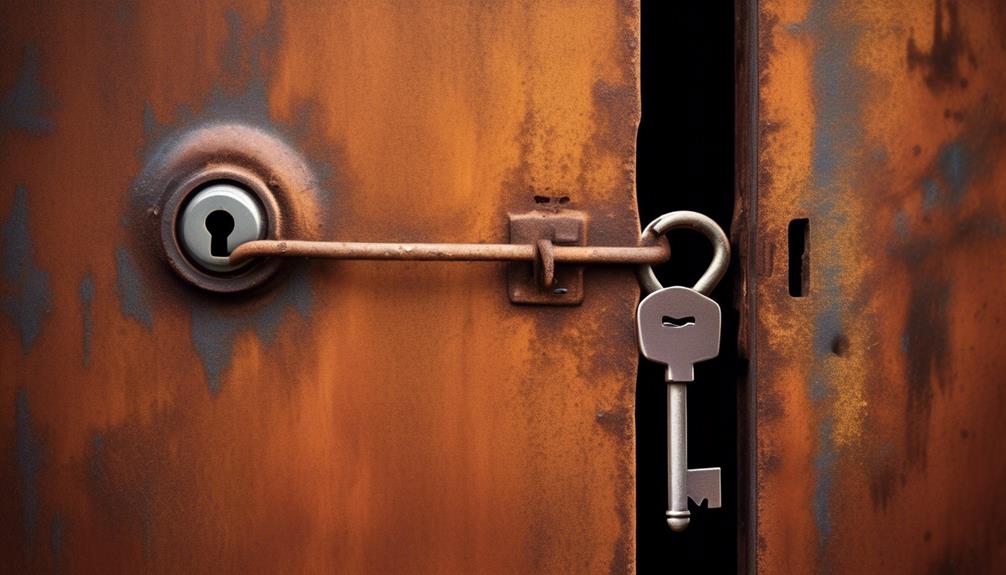
If you notice any difficulty in unlocking or locking your door, it may be a sign that your lock needs repairing. Ignoring these signs could lead to further damage and potentially compromise the security of your home or business. To help you identify whether your lock needs repair, here are some common signs of lock wear and tear:
| Signs of Lock Wear and Tear | What it Means |
|---|---|
| Key doesn't turn smoothly | Internal components may be worn |
| Loose or wobbly lock | Lock could be coming apart |
| Difficulty inserting or removing key | Keyway may be damaged |
If you experience any of these issues, it's crucial to seek the expertise of lock repair specialists. They have the knowledge and skills to assess the condition of your lock and provide the necessary repairs. Additionally, they can offer guidance on whether a lock replacement is a better option in cases of severe damage.
DIY Lock Repair Techniques
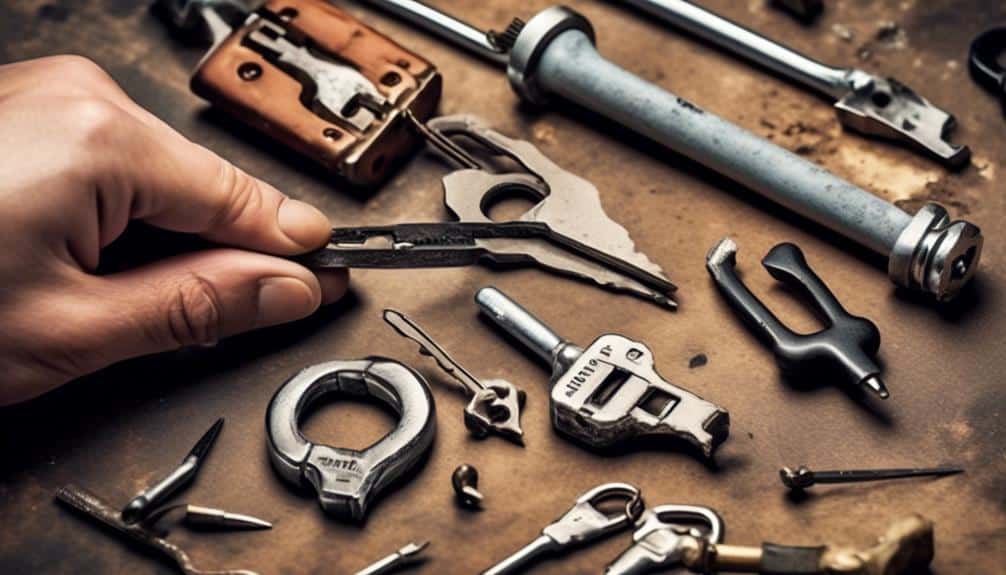
Now let's talk about some DIY lock repair techniques that can help you save time and money.
We'll discuss the essential tools you'll need for lock repair, common lock problems you may encounter, and step-by-step instructions to fix your locks.
Tools for Lock Repair
We can enhance the readability of our discussion on DIY lock repair techniques by emphasizing the significance of using the right tools. Having the appropriate tools can make the lock repair process easier and more efficient.
Here are some essential tools for lock repair:
- Screwdriver set: A set of screwdrivers with different sizes and types is crucial for removing screws and disassembling locks.
- Torx key set: Torx keys are commonly used in lock mechanisms, so having a set of these specialized keys is essential.
- Lock pick set: For more advanced DIY lock repair techniques, a lock pick set can be handy for manipulating pins and springs within the lock.
- Lubricant: A lock lubricant can help loosen stuck parts and reduce friction, making the lock function smoothly.
- Tweezers: Tweezers are useful for handling small lock components and for precision work.
Common Lock Problems
To effectively address common lock problems and successfully perform DIY lock repair techniques, understanding the underlying issues is crucial. Regular lock maintenance is important to ensure the proper functioning of your locks and to prevent potential security risks. Signs that your lock needs repairing may include difficulty in inserting or turning the key, a loose doorknob or handle, or a lock that fails to latch or unlock smoothly. By identifying these signs early on, you can take the necessary steps to repair your lock before it becomes completely dysfunctional. Below is a table highlighting some common lock problems and their possible causes:
| Common Lock Problem | Possible Causes |
|---|---|
| Key doesn't turn smoothly | Dirt or debris in the lock, misalignment of internal components |
| Loose doorknob or handle | Loose screws or worn-out components |
| Lock fails to latch or unlock smoothly | Misaligned strike plate, worn-out or damaged latch mechanism |
Step-By-Step Lock Repair
Using simple DIY lock repair techniques can save you time and money while ensuring the security of your home or property. Here is a step-by-step lock repair process that you can follow along with the common tools for lock repair:
- Start by examining the lock and identifying the problem. It could be a loose screw, a misaligned latch, or a stuck key.
- Use a screwdriver or Allen wrench to tighten any loose screws or bolts.
- Lubricate the lock with graphite powder or WD-40 to fix issues with sticking or jamming.
- If the latch is misaligned, adjust it by loosening the strike plate screws, repositioning the plate, and tightening the screws again.
- For a stuck key, apply a lubricant and gently wiggle the key in the lock to loosen it.
With these simple steps and common tools, you can easily repair minor lock issues yourself, saving time and money.
Hiring a Professional Locksmith
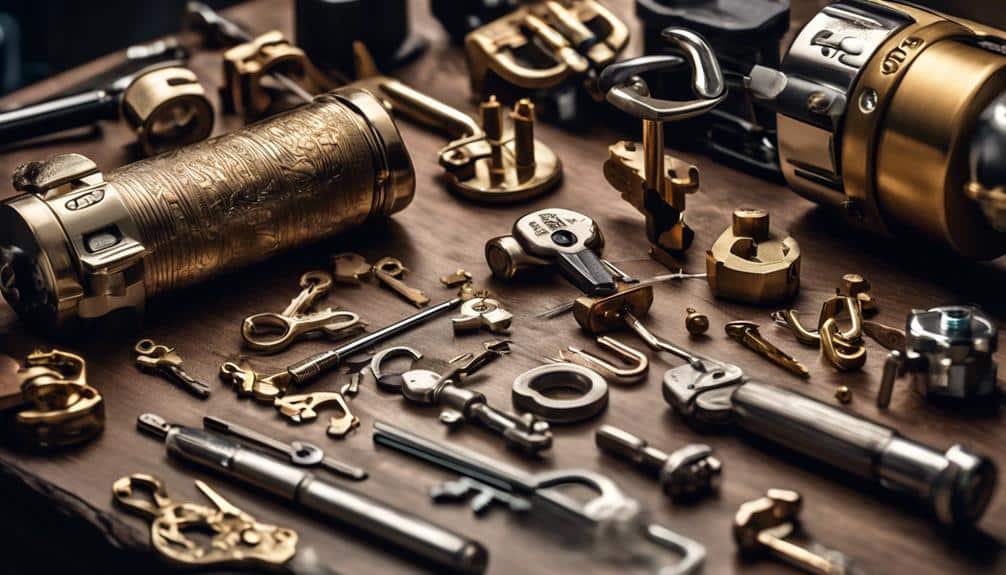
Hiring a professional locksmith ensures that your lock repair needs are handled efficiently and effectively. When it comes to finding a reliable locksmith, there are a few key factors to consider.
First, it's important to do your research and find a locksmith with a solid reputation. Look for online reviews and testimonials from previous customers to gauge their level of expertise and customer satisfaction. Additionally, check if the locksmith is licensed and insured, as this provides an extra layer of protection for both you and the locksmith.
Second, consider the locksmith's availability and response time. Emergencies can happen at any time, so it's crucial to hire a locksmith who offers 24/7 services and can respond quickly to your lock repair needs.
To help you make an informed decision, here is a comparison table showcasing three reliable locksmiths in your area:
| Locksmith | Reputation | Availability |
|---|---|---|
| ABC Locksmiths | ★★★★☆ | 24/7 |
| XYZ Locksmiths | ★★★☆☆ | Mon-Fri: 8am-6pm |
| 123 Locksmiths | ★★★★☆ | 24/7 |
Choosing the Right Lock Repair Service
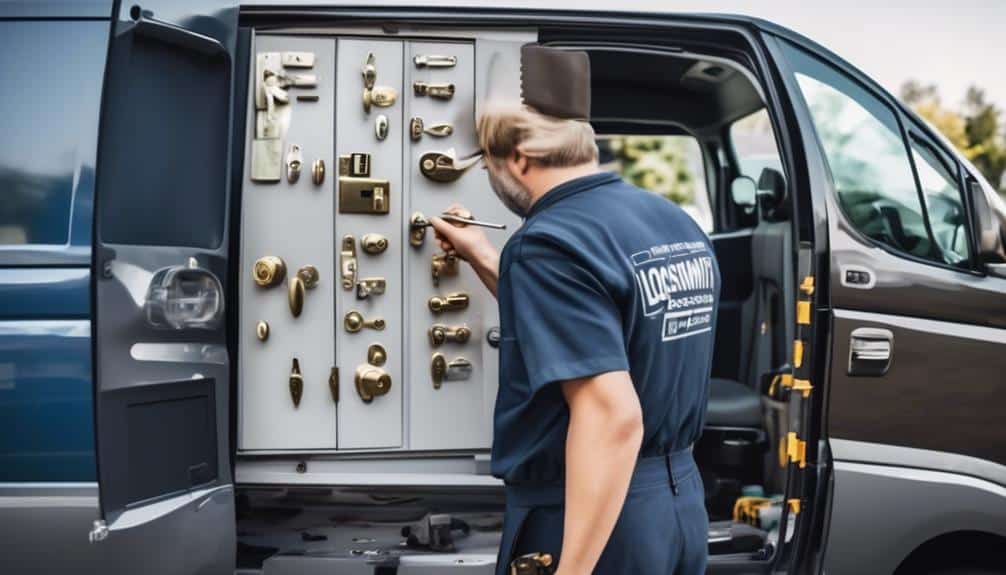
When it comes to choosing the right lock repair service, there are a few key points to consider.
First, you want to ensure that the service provider has a solid reputation and a track record of delivering quality work.
Second, expertise and experience are crucial, as you want someone who's knowledgeable and skilled in handling all types of locks.
Lastly, reading customer testimonials can provide valuable insights into the level of service and customer satisfaction you can expect.
Service Provider Selection
To find the best lock repair service for your needs, it's crucial to carefully consider various factors. Here are some key points to keep in mind when selecting a service provider:
- Reputation: Look for a company with a strong track record and positive customer reviews. This will give you confidence in their ability to deliver quality work.
- Expertise: Ensure that the locksmith you choose has experience and knowledge in repairing the type of lock you have. This will ensure a successful repair job.
- Efficiency: Time is of the essence when it comes to getting your lock fixed. Choose a service provider who can respond quickly and complete the repair in a timely manner.
- Customer satisfaction: Look for a locksmith who prioritizes customer satisfaction and goes the extra mile to ensure you're happy with their service.
- Service guarantee: A reputable locksmith should offer a service guarantee, assuring you that they stand behind their work and will address any issues that may arise.
Expertise and Experience
Finding a lock repair service with the right expertise and experience is essential for ensuring a successful and efficient repair job. When choosing a lock repair service, it's important to consider their knowledge of various lock repair techniques and their proficiency in using the right lock repair tools.
A reputable and experienced lock repair service will have a deep understanding of different types of locks and their mechanisms. They'll be equipped with the necessary tools and equipment to handle any lock repair job effectively.
Their expertise and experience will enable them to identify the root cause of the lock problem and provide the most appropriate solution. By entrusting your lock repair needs to a skilled and knowledgeable service provider, you can have peace of mind knowing that your locks are in capable hands.
Customer Testimonials
Customer testimonials are a valuable resource when choosing the right lock repair service. Reading what other customers have experienced can give you insights into the level of customer satisfaction and quality assurance provided by a particular company.
Here are some reasons why customer testimonials are important:
- They provide real-life experiences: Reading about other people's experiences with a lock repair service can help you gauge their level of expertise and professionalism.
- They build trust: Positive testimonials from satisfied customers can instill confidence in the reliability and competence of a lock repair service.
- They offer peace of mind: Knowing that others have had a positive experience with a lock repair service can alleviate any concerns or doubts you may have.
- They help you make an informed decision: Customer testimonials provide valuable information that can help you make a well-informed decision about which lock repair service to choose.
- They highlight the quality of service: Testimonials often highlight the quality of service provided by a lock repair company, giving you an idea of the level of satisfaction you can expect.
Costs Associated With Lock Repair
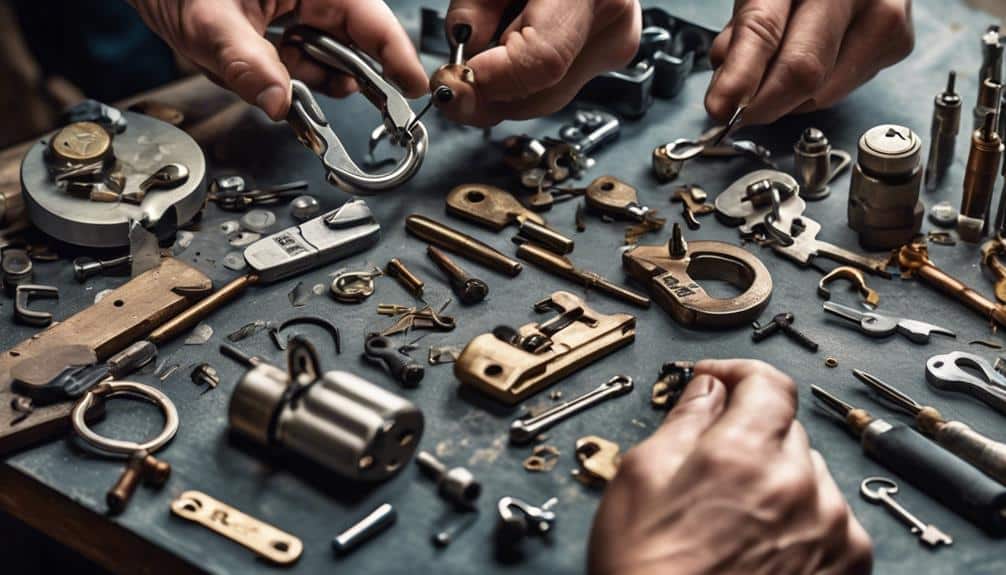
When considering lock repair, it's important to be aware of the associated costs. Several factors can influence the costs of lock repair.
The complexity of the lock issue and the type of lock being repaired are two primary factors. More complex lock issues, such as broken or damaged internal components, may require more time and expertise to fix, resulting in higher costs. Additionally, high-security locks or specialized locks may require specific tools or knowledge, which can also impact the overall repair cost.
Another factor to consider is whether to attempt DIY lock repair or hire professional services. While DIY lock repair may seem like a cost-effective option, it's important to weigh the risks and benefits. Locks are intricate mechanisms, and attempting repairs without proper knowledge or tools can lead to further damage or even lock failure. Professional locksmiths have the necessary expertise, experience, and tools to diagnose and repair lock issues effectively and efficiently.
In terms of cost, professional lock repair services may have a higher upfront expense compared to DIY repairs. However, considering the potential risks and the need for specialized tools, hiring a professional locksmith can save you time, effort, and potentially expensive mistakes in the long run. Additionally, professional locksmiths often provide warranties on their work, giving you peace of mind knowing that your repaired lock is covered.
Preventing Lock Damage and Break-Ins
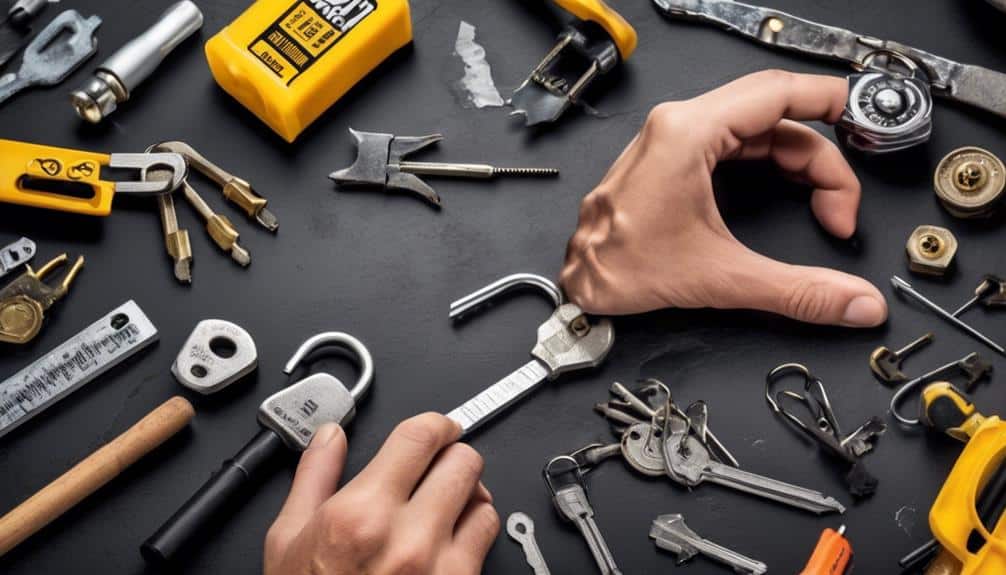
To prevent lock damage and break-ins, it's essential to implement effective security measures. By taking the following preventive measures and home security precautions, you can significantly reduce the risk of unauthorized access to your property:
- Install high-quality locks: Invest in sturdy deadbolts and secure locks for all entry points to your home.
- Reinforce doors and windows: Use solid core or metal doors, reinforce door frames, and install window security film or bars.
- Use a security system: Install a reliable alarm system that includes motion sensors, door/window sensors, and surveillance cameras.
- Secure outdoor areas: Install motion-activated lighting, trim shrubs near windows, and secure gates and fences.
- Practice good habits: Always lock your doors and windows when leaving, keep valuables out of sight, and avoid sharing sensitive information online.
Lock Repair for Different Types of Locks
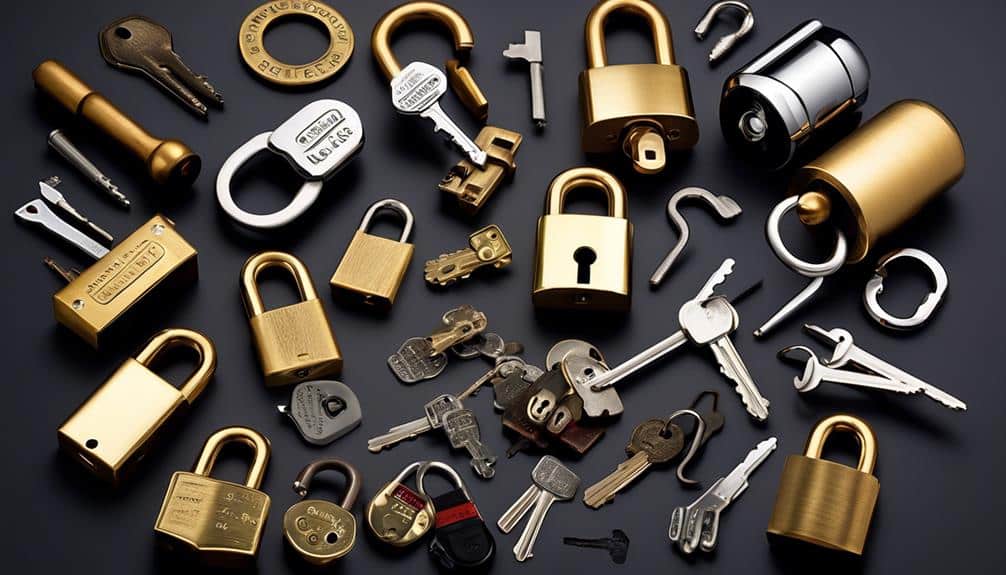
After implementing effective security measures to prevent lock damage and break-ins, it's important to be aware of lock repair techniques for different types of locks.
Different lock mechanisms require specialized lock repair techniques to ensure proper functionality and security.
One common type of lock is the cylinder lock, which consists of a cylinder that rotates to unlock the door. If the cylinder becomes damaged or gets stuck, it may need to be replaced or repaired.
Another type is the mortise lock, which is commonly found on older doors. This lock requires the expertise of a locksmith to repair or replace the intricate internal components.
For electronic locks, it's crucial to have a trained technician who understands the specific technology and programming involved. They can diagnose and repair any issues with the electronic components, such as faulty wiring or malfunctioning keypads.
Finally, for combination locks, it's essential to have the correct tools and knowledge to troubleshoot and repair any mechanical problems.
Frequently Asked Questions About Lock Repair

Lock repair is a common concern for many property owners, and it's important to address the frequently asked questions surrounding this topic. Here are some answers to commonly asked questions about lock repair:
- What's the cost of lock repair? Lock repair costs can vary depending on the type of lock, the extent of the damage, and the complexity of the repair. It's best to contact a professional locksmith for an accurate estimate.
- How do I know if my lock needs repair or replacement? In general, if the lock is still functioning but has minor issues like sticking or difficulty turning, it can usually be repaired. However, if the lock is severely damaged or outdated, it may be more cost-effective to replace it.
- Can I repair the lock myself? While some minor lock repairs can be done by homeowners, it's usually best to leave lock repairs to professionals. They have the necessary tools, expertise, and knowledge to properly diagnose and fix the issue.
- How long does lock repair take? The time it takes to repair a lock can vary depending on the complexity of the issue. Simple repairs may only take a few minutes, while more complicated repairs could take longer.
- Will lock repair affect the security of my property? Properly repaired locks shouldn't compromise the security of your property. In fact, repairing a damaged lock can improve its functionality and effectiveness in keeping your property secure.
Frequently Asked Questions
Can I Use WD-40 or Other Lubricants to Fix a Jammed Lock?
Using lubricants like WD-40 can be a quick fix for a jammed lock, but it has its pros and cons. While it can temporarily free up the mechanism, it may attract dirt and debris, causing more problems in the long run.
Alternatively, you can try using graphite powder or a silicone-based lubricant specifically designed for locks.
If the lock is severely jammed, it's best to call a professional locksmith to avoid causing further damage.
How Long Does It Typically Take to Repair a Lock?
On average, lock repairs can be completed in under an hour, but the time can vary depending on several factors. The complexity of the lock issue, the type of lock, and the availability of replacement parts can all affect the repair time.
Our team of experienced locksmiths is equipped to handle a wide range of lock repairs efficiently. We understand the importance of a quick resolution, and we strive to provide timely and reliable service to our customers.
Is It Possible to Repair a Broken Key Without Replacing the Lock?
Yes, it's possible to repair a broken key without replacing the lock. However, it's recommended to consult a professional locksmith for repairing broken keys to ensure proper and safe repairs. Attempting DIY repairs may further damage the key or the lock mechanism.
A locksmith has the expertise and specialized tools necessary to fix broken keys effectively. Trusting a professional locksmith ensures that the repair is done correctly and minimizes the risk of future issues.
Can I Repair a Damaged Lock Myself if I Have No Prior Experience?
When it comes to repairing locks, it's possible to do it yourself even without prior experience. However, it's important to consider the complexity of the lock and the extent of the damage.
Simple issues like loose screws or misaligned components can be fixed with basic tools and some online tutorials.
However, for more complicated problems or if you're unsure about your skills, it's best to hire professionals who have the expertise and proper tools to ensure a successful repair.
What Should I Do if My Lock Is Still Not Functioning Properly After Repair?
If your lock is still not functioning properly after repair, it can be frustrating. We understand how important it's to have a secure lock, so let's troubleshoot the issue.
First, check for signs of a damaged lock, such as difficulty turning the key or a loose handle. If you notice any of these, it may be necessary to call a professional locksmith. They've the expertise to diagnose and fix the problem efficiently.

